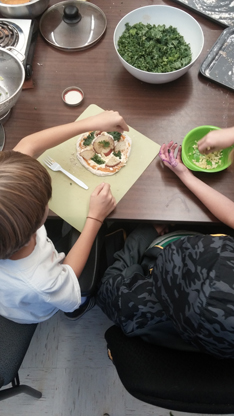CitySprouts Teaches Kids to be "Pizza Scientists"
How do you engineer a pizza? That's the question that drove over 50 students at the Vassal Lane and Rindge Avenue Upper Schools this fall. These kids flocked to the CitySprouts' middle-school program to get the chance to make a pizza from scratch. In the process they became not only great cooks, but budding scientists and engineers as well.
 "We want kids to say, 'I did science and it was fun,'" said Erin Taylor, CitySprouts' garden coordinator, program associate, and author of the middle-school program's curriculum. "The idea behind the program is that we use cooking and food as a way to build scientific skills."
"We want kids to say, 'I did science and it was fun,'" said Erin Taylor, CitySprouts' garden coordinator, program associate, and author of the middle-school program's curriculum. "The idea behind the program is that we use cooking and food as a way to build scientific skills."
In Erin's innovative curriculum, the project of making a pizza becomes the vehicle for teaching a tremendous range of STEM (science, technology, engineering and math) concepts. "We frame making a pizza as an engineering challenge," Erin said. "When engineers approach a problem, they need to define their goals and work within certain constraints. They need to test their ideas and make improvements. Our program guides kids through that process in a thoughtful way."
After writing the program's curriculum, Erin worked with CitySprouts' three FoodCorps Service Members -- Corey Carmichael, Rochelle Li, and Brittany Hsu -- to get the program up and running. The three service members then led groups of students through the pizza-making process, with stops along the way to investigate the science of cooking.
"The butter experiment was a big hit," said FoodCorps Service Member Corey Carmichael. In that activity, students learned to churn butter in jars, but before they churned the butter they made predictions about how the butter would come out based on several variables (whole milk or reduced-fat milk? Room temperature or chilled?). After they finished churning butter, they tested their predictions against reality.
Activities like the butter experiment prompt kids to think scientifically while working on a project that is fun and relevant to them. A major strength of project-based learning is its power to connect learning across many domains to a concerete activity that is meaningful.
"The main focus of the curriculum is teaching STEM skills," said Erin, "but other skills naturally follow from that." Working together on a project fosters middle schoolers' social and emotional development. In order to collaborate, they must communicate with each other effectively and make decisions as a group, skills that will serve them well for the rest of their lives.
And then there's the food. "The point of the program isn't to drill kids with information about nutrition," said Erin, "but information is just one way to drive behavior change, and not always the most effective one. Our program helps kids eat better by giving them familiarity and practice with healthy food." Over the course of the program, Erin explained, students will try at least one new vegetable every week and practice preparing it. This gives kids the self-efficacy they need to make enduring changes in their habits.
The promise of the program's final product -- a pizza made exactly the way the students designed, with test-tested ingredients straight from the school garden -- formed a powerful motivator for kids. "My kids are very ready for this pizza," said Corey. "We've been talking it up for a while. But they have enjoyed every step. They ask me if we can make dough every week!"

